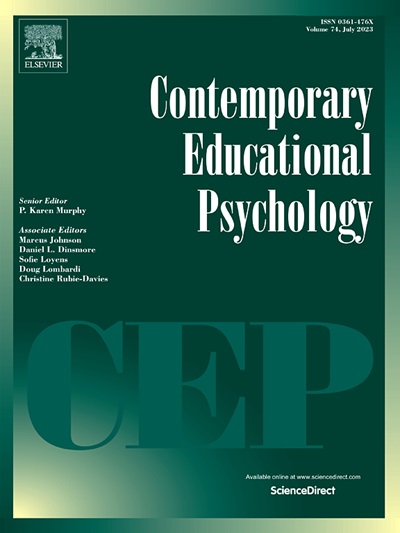Students ignore their mistakes: Elaborated error feedback processing in a digital learning system
IF 3.8
1区 心理学
Q1 PSYCHOLOGY, EDUCATIONAL
引用次数: 0
Abstract
Digital learning systems widely used in secondary schools frequently utilize formative mastery assessments to evaluate prior knowledge and provide elaborated feedback with recommendations for subsequent learning steps. While elaborated feedback is often considered beneficial for low-achieving students, research indicates that these students may overlook such feedback in digital learning environments. This study examines the interplay between student aptitude (school type, grade, and prior knowledge), task complexity, response certitude, and various facets of elaborated error feedback processing after formative mastery assessments: error feedback seeking, error feedback comprehension, and error feedback appraisal (perceived usefulness).
We analyzed 20,058 formative assessment cases from an adaptive German grammar app implemented in 182 secondary classrooms, encompassing 2,826 students. The key findings are: (1) Students in higher grades and academic-track secondary schools are more likely to seek elaborated error feedback but are more critical of its usefulness. (2) Task complexity (course content and level) significantly influences error feedback processing behaviors. (3) Low formative assessment scores, indicating low prior knowledge, are strongly associated with reduced error feedback seeking and error feedback comprehension, as well as a more critical perspective on error feedback usefulness. (4) Response certitude, particularly in cases of failing formative assessments, is positively linked to error feedback seeking and perceived error feedback usefulness.
These findings contribute to advancing feedback processing models by highlighting the importance of contextual factors in digital learning environments. Future research should focus on system-specific influences such as content complexity, error feedback structure, and options to choose or disregard error feedback.
学生忽略他们的错误:数字学习系统中详细阐述的错误反馈处理
在中学广泛使用的数字学习系统经常使用形成性掌握评估来评估先前的知识,并为后续学习步骤提供详细的反馈和建议。虽然详细的反馈通常被认为对成绩差的学生有益,但研究表明,这些学生在数字学习环境中可能会忽略这种反馈。本研究探讨学生天资(学校类型、年级和先前知识)、任务复杂性、反应确定性,以及形成性掌握评估后的详细错误反馈处理的各个方面:错误反馈寻求、错误反馈理解和错误反馈评价(感知有用性)之间的相互作用。我们分析了来自一款适应性德语语法应用程序的20,058个形成性评估案例,该应用程序在182个中学教室中实施,涉及2,826名学生。主要发现有:(1)高年级和学制中学的学生更倾向于寻求详细的错误反馈,但对其有用性更挑剔。(2)任务复杂性(课程内容和水平)显著影响错误反馈处理行为。(3)较低的形成性评估分数表明较低的先验知识,与较少的错误反馈寻求和错误反馈理解以及对错误反馈有用性的更批判性的观点密切相关。(4)反应确定性,特别是在形成性评估失败的情况下,与错误反馈寻求和感知错误反馈有用性呈正相关。这些发现强调了数字学习环境中情境因素的重要性,有助于改进反馈处理模型。未来的研究应侧重于系统特定的影响,如内容复杂性、错误反馈结构以及选择或忽略错误反馈的选项。
本文章由计算机程序翻译,如有差异,请以英文原文为准。
求助全文
约1分钟内获得全文
求助全文
来源期刊

Contemporary Educational Psychology
PSYCHOLOGY, EDUCATIONAL-
CiteScore
16.50
自引率
3.90%
发文量
74
期刊介绍:
Contemporary Educational Psychology is a scholarly journal that publishes empirical research from various parts of the world. The research aims to substantially advance, extend, or re-envision the ongoing discourse in educational psychology research and practice. To be considered for publication, manuscripts must be well-grounded in a comprehensive theoretical and empirical framework. This framework should raise critical and timely questions that educational psychology currently faces. Additionally, the questions asked should be closely related to the chosen methodological approach, and the authors should provide actionable implications for education research and practice. The journal seeks to publish manuscripts that offer cutting-edge theoretical and methodological perspectives on critical and timely education questions.
The journal is abstracted and indexed in various databases, including Contents Pages in Education, Australian Educational Index, Current Contents, EBSCOhost, Education Index, ERA, PsycINFO, Sociology of Education Abstracts, PubMed/Medline, BIOSIS Previews, and others.
 求助内容:
求助内容: 应助结果提醒方式:
应助结果提醒方式:


